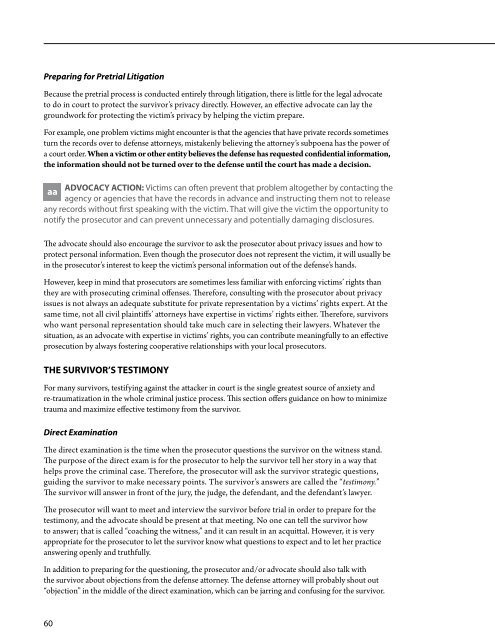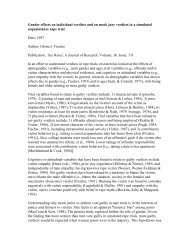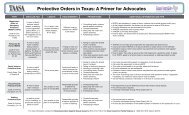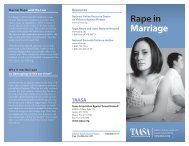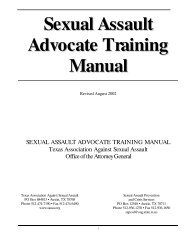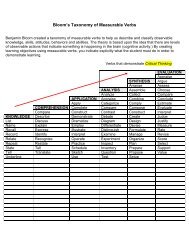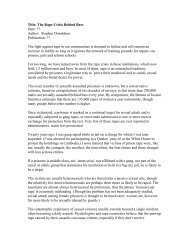Sexual aSSault LEGAL ADVOCACY MANUAL - Texas Association ...
Sexual aSSault LEGAL ADVOCACY MANUAL - Texas Association ...
Sexual aSSault LEGAL ADVOCACY MANUAL - Texas Association ...
You also want an ePaper? Increase the reach of your titles
YUMPU automatically turns print PDFs into web optimized ePapers that Google loves.
Preparing for Pretrial Litigation<br />
Because the pretrial process is conducted entirely through litigation, there is little for the legal advocate<br />
to do in court to protect the survivor’s privacy directly. However, an effective advocate can lay the<br />
groundwork for protecting the victim’s privacy by helping the victim prepare.<br />
For example, one problem victims might encounter is that the agencies that have private records sometimes<br />
turn the records over to defense attorneys, mistakenly believing the attorney’s subpoena has the power of<br />
a court order. When a victim or other entity believes the defense has requested confidential information,<br />
the information should not be turned over to the defense until the court has made a decision.<br />
<strong>ADVOCACY</strong> ACTION: Victims can often prevent that problem altogether by contacting the<br />
agency or agencies that have the records in advance and instructing them not to release<br />
any records without first speaking with the victim. That will give the victim the opportunity to<br />
notify the prosecutor and can prevent unnecessary and potentially damaging disclosures.<br />
The advocate should also encourage the survivor to ask the prosecutor about privacy issues and how to<br />
protect personal information. Even though the prosecutor does not represent the victim, it will usually be<br />
in the prosecutor’s interest to keep the victim’s personal information out of the defense’s hands.<br />
However, keep in mind that prosecutors are sometimes less familiar with enforcing victims’ rights than<br />
they are with prosecuting criminal offenses. Therefore, consulting with the prosecutor about privacy<br />
issues is not always an adequate substitute for private representation by a victims’ rights expert. At the<br />
same time, not all civil plaintiffs’ attorneys have expertise in victims’ rights either. Therefore, survivors<br />
who want personal representation should take much care in selecting their lawyers. Whatever the<br />
situation, as an advocate with expertise in victims’ rights, you can contribute meaningfully to an effective<br />
prosecution by always fostering cooperative relationships with your local prosecutors.<br />
The Survivor’s Testimony<br />
For many survivors, testifying against the attacker in court is the single greatest source of anxiety and<br />
re-traumatization in the whole criminal justice process. This section offers guidance on how to minimize<br />
trauma and maximize effective testimony from the survivor.<br />
Direct Examination<br />
The direct examination is the time when the prosecutor questions the survivor on the witness stand.<br />
The purpose of the direct exam is for the prosecutor to help the survivor tell her story in a way that<br />
helps prove the criminal case. Therefore, the prosecutor will ask the survivor strategic questions,<br />
guiding the survivor to make necessary points. The survivor’s answers are called the “testimony.”<br />
The survivor will answer in front of the jury, the judge, the defendant, and the defendant’s lawyer.<br />
The prosecutor will want to meet and interview the survivor before trial in order to prepare for the<br />
testimony, and the advocate should be present at that meeting. No one can tell the survivor how<br />
to answer; that is called “coaching the witness,” and it can result in an acquittal. However, it is very<br />
appropriate for the prosecutor to let the survivor know what questions to expect and to let her practice<br />
answering openly and truthfully.<br />
In addition to preparing for the questioning, the prosecutor and/or advocate should also talk with<br />
the survivor about objections from the defense attorney. The defense attorney will probably shout out<br />
“objection” in the middle of the direct examination, which can be jarring and confusing for the survivor.<br />
60


